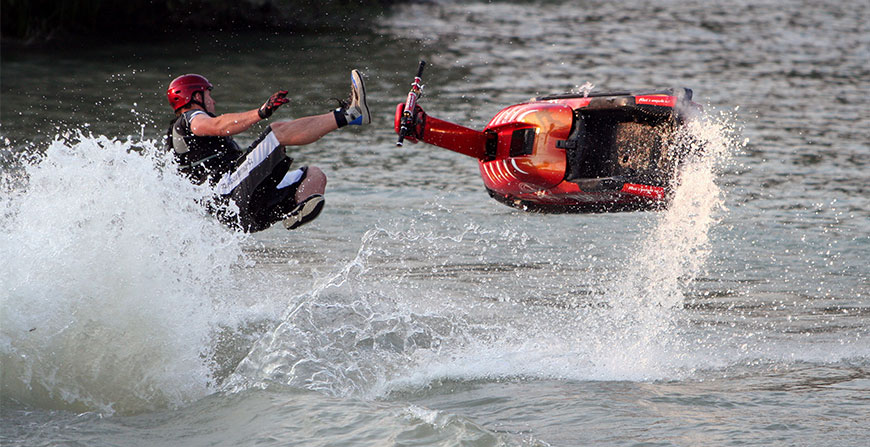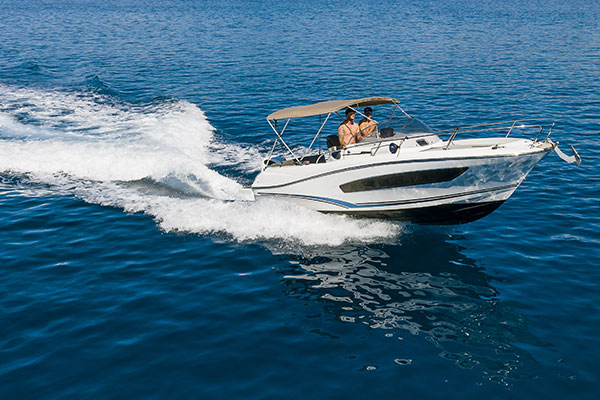
Austin Boat Accident Attorneys, Texas
Help for Texans injured on boats, jet skis, and other recreational watercraft
There are few things better than a lazy day on the river or a lake, and few places more perfect for water-based activities than the lakes around Austin. Whether you’re looking for a boat rental, hiring a party boat, or you are ready to try your hand at water-skiing, or you just want to sail away on your own for a weekend or holiday, there is much to consider from the safety standpoint.
The Austin boat accident attorneys at Slack Davis Sanger a not only skilled litigators but they are boat owners and operators themselves. The know the dangers of watercraft-related activities and how devastating boat injuries and accidents can be. For some victims, the injuries are fatal and in many they result in permanent, life-altering consequences. Our personal injury lawyers are here to help you understand your options and guide you through the process of determining your best course of action. Contact us in Austin to discuss your potential matter with one of our team to learn more about our services.
Where do boating accidents happen in Austin?
As a riverside city in the Texas Highland Lakes region, Austin offers many opportunities to for recreation on lakes and rivers. Slack Davis Sanger represents people who suffered injuries in during water recreational activities in boats and personal watercraft (PWC) accidents. Our attorneys are familiar with and have handled accident cases arising on many of the lakes and rivers listed below.
|
|

What are the causes of boat accidents in Austin?
Boating accidents are often the result of:
Boating while impaired. The use of alcohol by boat drivers is one of the most common reasons for accident. In fact, Texas law imposes standards for alcohol levels for boat drivers just like drivers of automobiles. Boat operators, just like drivers, must be have the judgment to operate at safe speeds and the reactions to avert unsafe situations that arise on the water when others are reckless. A boat driver impaired by drugs or alcohol puts everyone at risk – the boat occupants as well as other boats on the water. In Texas, it is illegal to operate any type of boat, jet ski, or other water vessel while intoxicated. A blood alcohol content of 0.08% or greater is considered “intoxicated.” Further, it is illegal to operate any watercraft if your mental or physical faculties are impaired, even though your BAC may be below 0.08%. In Texas, almost 50% of the boating accidents involve alcohol or drug use.
Operator inexperience. Operating a watercraft, just like driving a car, demands experience and expertise. This is why Texas Parks and Wildlife (TPWD) requires that any potential operator born after September 1, 1993 successfully complete a TPWD-approved course in order to operate a vessel if the boat is equipped with a motor of at least 15 horsepower OR it is a wind-powered vessel more than 14’ in length. However, one course is not enough to make an operator safe. Boat driver inexperience, usually accompanied by poor judgment, can be a fatal combination.
Reckless, speeding, or negligent operators. Boat operators owe their guests (or patrons) a duty of care. When an operator is speeding, distracted, or failing to follow the laws which govern boat safety in Texas, he or she puts people at risk.
Equipment defects. A defective boat condition or part can result in all kinds of dangers. Escaping a boat on fire is a much different proposition on the water than on land. An otherwise survivable boat accident can turn into a tragedy when a passenger puts on a defective life jacket or there are not enough life jackets and approved flotation devices for all passengers. Many drownings in the aftermath of a boat accident are tragically preventable just by having the correct safety equipment on board and instructing passengers how to use it.
Bad weather. Boat operators must pay close attention to weather which can change rapidly and unexpectedly over water. Certain bodies of water are large enough to have their own weather systems during certain times of the year. The responsibility for knowing and checking weather forecasts rests on the driver or operator’s shoulders. The worst transgression is a driver or operator who elects to proceed launch a boating excursion in the face of developing bad weather. Sadly, there are far too many examples of boating accidents that resulted from a driver or operator doing the wise thing and cancelling a boating trip when dangerous weather conditions are imminent.
Low Light or Low Visibility Conditions. Like bad weather, boat drivers and operators should plan carefully before embarking upon an excursion in low light or low visibility conditions. All required boat lights much be checked to ensure that the boat is visible to other boat drivers. Speed is an important factor is boat accidents after dark or in low visibility conditions such as fog. Unlike automobiles, boats are not required travel along a prescribed path and boats can converge on each other from each direction. A common boating accident scenario in low light or low visibility conditions is a collision, usually at higher speed, between two boats, or a boat and fixed object, such as a dock, which resulted from the boat operating having inadequate reaction time to avoid the danger. Human reaction time does not improve as the boat speed increases, so reduced speeds and well-lit boats are imperatives when operating in low light or low visibility conditions.
What are the types of boat accidents you handle?
The Austin boat accident attorneys of Slack Davis Sanger handle a wide array of claims involving watercraft. While many of the people we represent are injured in collisions with boats, docks, or other vessels, we also handle claims involving:
|
|
Whether you were on a tube floating trip, riverboat cruise, SCUBA diving, or fishing in a local river, Slack Davis Sanger has the skills and resources you want on your side. Our team is prepared to help you if you sustained injuries on the following types of boats:
- Sailboats
- Speedboats
- Kayaks
- Canoes
- Pontoons
- Houseboats
- Party barges
- Racing boats
- Riverboats
What kinds of injuries do boat and PWC accidents cause?
Because of the nature of these types of accidents, victims often suffer catastrophic injuries, including spinal cord injuries, traumatic brain injuries, head injuries, and broken limbs. Collisions can lead to fires and explosions, not to mention the ever-present risk of drowning. In fact, according to TPWD, “where cause of death was known, 79% of fatal boating accident victims drowned.” This is, by far, the greatest injury.
However, other serious injury modalities occur in boating and water recreational activities. A person who goes parasailing may fall 500 feet into the water below if something goes wrong, leading to multiple complex, compound fractures and/or internal organ damage, if the victim even survives.
The Austin boat accident attorneys of Slack Davis Sanger represent victims who have sustained injuries such as:
- Traumatic brain injuries
- Spinal cord injuries and paralysis
- Traumatic amputation and limb loss
- Burn injuries
- Oxygen deprivation leading to brain damage
- Multiple broken bones and/or limbs
- Organ damage
- Permanent scarring and disfigurement
Who is liable for an Austin boat accident?
Boating accident liability laws can be complex. The laws of each state vary, and, in some instances, states have afforded complete or partial immunity to certain potential defendants otherwise liable for injuries or deaths arising from recreational activities. The exact circumstances of your case will dictate who can be held liable for your injuries. Generally, the liable parties may include:
The boat or watercraft driver or operator, either of your vessel or of a different vessel which caused you harm
The boat owner, if different from the operator
The company you hired for your tour, or from which you rented a watercraft
The manufacturer, in cases of defective equipment or safety gear
Other passengers, if their reckless behavior led to the incident which caused your injuries
There may be others, depending on the nature of your case.
How long do I have to file a boat accident claim in Austin?
Generally speaking, you have two (2) years from the date of injury or death to file a lawsuit for personal injury or a wrongful death damages. If your claim arises on publicly controlled and managed waters and involves a unit of state or local government, there may be a notice requirement that can be as short as thirty (30) days. Accidents occurring on water may also involve admiralty or maritime claims, especially if the accident occurs offshore. Persons with claims arising from a boat accident must act quickly to have the matter evaluated by an experienced and qualified lawyer to avoid lapses in mandatory notice and filing requirements.
What damages can I seek for a watercraft accident in Austin?
In Austin and throughout Texas, you can seek the following damages in an injury claim or lawsuit:
- Medical expenses, current and future
- Disfigurement and physical impairment
- Lost wages and loss of earning potential
- Pain and suffering, for both physical and mental trauma
In some circumstances, especially where reckless conduct, especially drugs or alcohol are involved, you may be entitled to seek punitive damages as well.
Do you have a boat accident lawyer near me?
Slack Davis Sanger has an office located in Austin, Texas at 6001 Bold Ruler Way, Suite 100. We have experienced boat accident attorneys at our offices in Dallas and Fort Worth locations too. On request and when necessary, our attorneys will come to you or your family to meet and discuss your potential case and the next steps.
Contact an experienced Austin boat and watercraft accident lawyer today
When you are injured, Slack Davis Sanger is ready to help. Our experienced Austin personal injury lawyers handle boat and watercraft accident claims for clients throughout Texas. To learn more about our services, or to schedule a free consultation at one of our offices please call 800-455-8686 or fill out our contact form below.
Related Articles
Austin Office
6001 Bold Ruler Way
Suite 100
Austin, TX 78746
Main Austin Practice Areas
